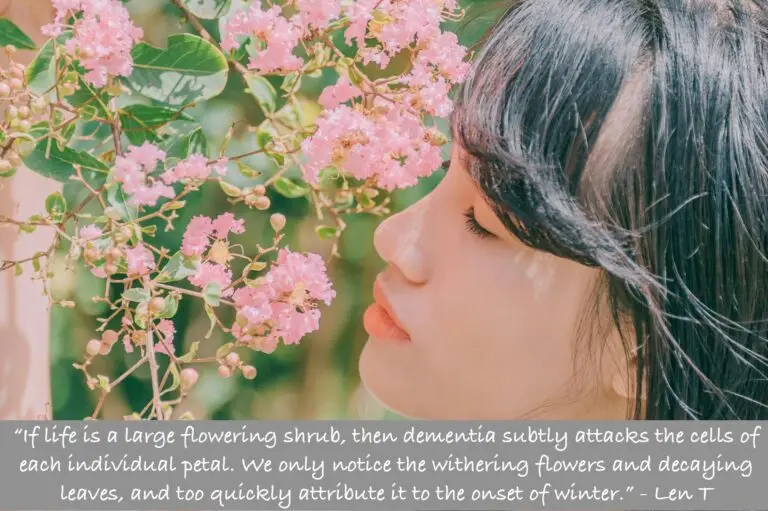
Dementia Is a Classic Hidden Disability and a Disease.
Dementia is a disability! Wow, what an enlightening moment it was when I first heard it described as such… It proved true on so many levels. Somehow, it seems easier to embrace a disability, possibly because it feels less wretched and futile. I now realise that my perspective shifted, and the practical aspects of Tina’s care became more constructive and manageable. I could then focus on adaptations, support, and quality of life.
Convincing Tina that dementia was a disability was groundbreaking. Before her diagnosis, Tina had developed strategies to mask her difficulties. She knew something was not right but worried that people would think her foolish or worse, so she started avoiding people and situations where she felt pressured to perform. Tina took some convincing, but once she accepted dementia as a disability, she felt able to be open, to tell people, and to re-engage with her world; her confidence grew.
Obviously, dementia is a hidden disability, meaning it is usually not apparent to the public. Strangers may not understand certain disability-related behaviours, as there are no visible signs of a disability. What was less obvious, but became a much bigger issue, was the dynamic of this hidden disability. The impairments caused by Tina’s dementia were perceived differently by Tina herself, by me as her primary caregiver, and by friends and family who interacted with her intermittently. In effect, it was somewhat hidden from everyone.
We are used to disabilities that are known and stable, which rarely alter; but dementia is constantly at work, eroding the brain’s capabilities, and we are only able to notice the step changes. In Tina’s case, the hidden nature of her condition often led to well-meaning but clumsy interactions from friends and family, which would upset her and cause her to react negatively.
“If life is a large flowering shrub, then dementia subtly attacks the cells of each petal. We only notice the withering flowers and decaying leaves and too quickly attribute it to the onset of winter.” Len T
Treating dementia as a disability became a conundrum. In many respects, the benefits were clear and the impact huge, but in others, it was more complex and subtle, which, if mishandled, could have just as much impact, albeit in a negative sense.

The two years preceding Tina’s retirement were particularly difficult and stressful for her, so when she retired, she was as happy as I had ever known her. However, it soon became clear to me that she was suffering from a major issue. I couldn’t burst that bubble of happiness, and Tina was not ready to admit there was a problem, so seeking medical advice was delayed. It appears that Tina had been living with dementia for at least three years before she was diagnosed, and during that time, she had learned to function with her declining abilities. We often refer to people masking their symptoms, but it’s far more fundamental than that. Tina had no option but to find ways to compensate and learn how to continue living a normal life, unaware of what was happening to her.
Tina’s consultant was excellent, but he had only one piece of actionable advice: he told me it was essential for Tina to maintain social contacts, as this was the best way to keep her brain active and possibly slow the impact of the dementia. Therein lay the first challenge. In previous years, Tina had internalised her diminishing sense of self, concluding that she was becoming absent-minded, inept, and, worst of all, foolish in the eyes of others. She became selective in her social interactions; small gatherings with people she knew well were acceptable, but larger ones were a nightmare for her. More subtle indicators were also apparent, such as her reluctance to make decisions—even very basic ‘either-or’ ones—in case she made a foolish choice.
Only those people with whom Tina interacted frequently were permitted to know of her diagnosis, as hiding it was not an option, but everyone else was not to know. It became clear that Tina was already on the path of withdrawing from the social contact that was strongly advised for her.
Convincing Tina that dementia was a disability, and that people understood and were supportive of those with disabilities, was the single most effective intervention we encountered throughout her journey. Not only did her stress subside, but her confidence grew, and her self-esteem almost fully recovered. This openness on Tina’s part also allowed good things to enter her life. She could be herself, enjoy life, and welcome the love and support that had been waiting for a chance to be helpful.
My favourite example involves her son. They hadn’t been close, but that changed; he became very supportive and sensitive to her needs. Tina not only enjoyed her son’s love while she could still appreciate it, but she also cherished a couple of years as a hands-on grandma, which she adored.
For a time, life wasn’t that challenging. We were very close, so dealing with the impact of her continued cognitive decline tended to bring us even closer. I simply took on anything Tina could no longer handle, and we usually laughed it off with some humour. What I didn’t realise, because it was happening naturally, was that I only intervened when necessary—and only when it was perceived as such by Tina or I did it surreptitiously.
When Tina shared her dementia diagnosis with others it opened the door for her friends and family to stomp in, armed with a plethora of sage wisdom and practical advice—most of which wasn’t based on personal experience. Of course, their intentions were good, but their enthusiasm turned out to be insensitive. We were all in uncharted territory, but we needed to adapt—and do so quickly.
If you search the internet for ‘how to help someone with dementia,’ you’ll find masses of advice, usually presented as if it’s suitable for everyone living with the disease. Well, it isn’t helpful for everyone, and it can sometimes have the opposite effect! The advice may be pertinent, but only in certain cases. For example, music as therapy is always on the list, and you could be forgiven for thinking that everyone would benefit from it. However, not everyone does, even though live music can be a popular form of entertainment for many. The key is to implement what works, and only when it’s appropriate.
Can you imagine being an adult in your own home and being bombarded by people advising you on what you need? Now imagine that when you struggle to keep pace with conversations and process information, and everything you’re told just reminds you of your terminal illness. Unintentionally, but nonetheless, Tina sometimes suffered at the hands of those who loved her and tried to help. Fortunately, the majority of her close family and friends recognised the situation and learned to take their lead from Tina. If they were unsure, they would discuss things with me.
Another significant lesson that emerged as the number of people interacting with Tina increased was how to communicate with her. Too often, Tina was not addressed as an adult, was ignored while conversations continued around her, or felt patronised. Her response was usually swift and predictable. If we were at home, she would take me aside, share her upset, and expect me to fix it. If we were elsewhere, she would simply announce that it was time to leave. In my opinion, these were the actions of a mature adult, not the child she felt she was being treated as.
Tina’s disability sometimes meant she needed assistance in ways reminiscent of a child’s needs, which likely influenced people’s tone, words, and overall approach when communicating with her. In fact, Tina was a very capable person, and although dementia was taking from her, what remained was not a child but that same capable individual. How incredibly appalled Tina must have felt, thinking that others thought her feebleminded and child like. I am surprised she remained so relatively calm, but that is exactly how the fully functioning adult Tina would have acted—with grace and determination.
People are often apprehensive about spending time with those living with dementia, sometimes feeling scared or intimidated, but most of the time, there is no need for this as long as you join them in their world, respond to what they perceive, and treat them with the same respect you would want for yourself.

Living alongside any disability calls for sensitivity and respect. It’s important to acknowledge what a person can do rather than assume limitations. Dementia is no different; although its hidden nature makes assessing what someone can do, what they need, or what they want difficult and easy to misunderstand, it is still necessary.
The same applies to communication. What remains of an individual’s faculties belongs to a mature adult, and that too must be acknowledged and respected, even in the advanced stages of dementia when there is no apparent recognition, engagement, or responsiveness to their surroundings. You simply do not know what is still functioning so always ask their opinion or permission.
Managing Tina’s dementia as a disability involved supporting her in ways that helped her maintain dignity, independence, and quality of life. By treating dementia as a disability, I focused on maximising Tina’s ability to engage with her environment and community and creating the best possible quality of life. I admit that I sometimes failed Tina with my own insensitivity; however, by embracing her dementia, living in her world when in her company, and listening to her signals, I was able to successfully walk her path with her. I hope that respecting her disability helped me support Tina in doing more for longer.

Did you like this post? Please leave a comment or share it. It helps to promote the blog so others can find it.

Very insightful and well written Len.